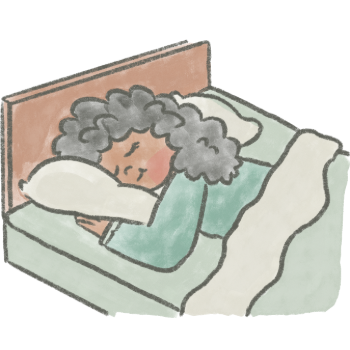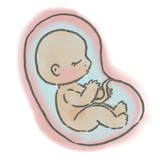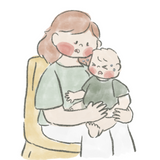How to Get Back to Sleep After Feeding or Tending to Your Baby?
Getting up in the middle of the night to feed or tend to your baby's need is a reality of parenting. And once you are done settling your baby, it can be often difficult to return back to sleep. Instead you may find yourself lying awake, worrying about getting back to sleep.
Of course the ultimate goal is to get your child to eventually sleep through the night. And things will eventually get better. But in the meantime, here are some tips to help you get back to sleep from your middle of the night wake-up calls:
Try Not to Force Yourself to Sleep
The worst thing you could do you when you can't fall asleep is to lie in bed and try and force yourself to sleep. Sleep can't be forced, and actively trying to force yourself to sleep can backfire.
Turn Your Clock to The Wall
Watching the clock and counting the minutes and hours you've been awake is likely to make you even more distressed about losing sleep and make it harder for you to fall back to sleep.
Relax Your Mind With Deep Breathing and Visualisation
Do some deep breathing slowly and steadily from your belly. Try repeating a phrase while doing this to quieten your mind. Visualising sights, sounds, and scents of a peaceful place can also help you distance yourself from stress.
Relax Your Body With Progressive Muscle Relaxation
Starting from your toes to your head, tense each muscles groups for 5 seconds, then relax. Start at the toes, move to the feet, then the calves, thighs, buttocks, abdomen, back and shoulders, arms, hands, fingers, forehead, face and finally, your eyes. This form of progressive muscle relaxation exercise can have your body feeling very relaxed.
Roll Your Eyes
Close your eyes and slowly roll your eyeballs upwards a few times.
Research suggests that when you roll your eyes up to an angle of about 20 degrees, the brain shifts from its alert beta state to the relaxed alpha state, characterised by a slowing of brain waves, helping you drift off.
Count Your Blessings
Fed up of counting sheep? Count your blessings instead. Tally up a list of good things (big or small) that has happened to you that day. Doing this puts your mind into a more conducive state for sleep by inducing a sense of calm.
Try Some Lavender Hand Cream
The soothing lavender scent can help you relax and prepare for sleep.
Get Out of Bed and Do Something Relaxing
If you can't get back to sleep within 20 minutes (use your mind clock) or so, get up and go to another room, to avoid risk of associating your bed with not sleeping. Do something relaxing, such as reading a book, listening to audio books (something you already know well) or calm music, sipping from a mug of warm milk. Keep the lights dim and resist the urge to use your smart phone, tablet or watch TV, the blue light from these devices can suppress your brain's production of melatonin, a hormone that promotes sleepiness. When you start to feel drowsy, go back to bed.
Eat a Small Bowl of Oatmeal, Cheerios or Rice Cereal With Milk
Consuming a midnight snack that combines carbohydrates together with a small amount of protein (milk) is sure to help you get back to sleep.
Milk contains tryptophan - an essential amino acid that helps to raise serotonin (one of the key brain chemicals that helps promote feelings of calm, relaxation) and melatonin (a hormone that promotes sleepiness) levels in the body, and therefore help induce sleep. However, tryptophan must first cross the blood-brain barrier in order to have any effect on sleep. As it happens tryptophan is the least abundant amino acid. It is forced to fight for access against the more common amino acids.
This is where carbohydrate sources such as oatmeal, cheerios, or rice cereal come into play. When carbohydrates are consumed, the body produces insulin, which diverts other amino acids to body muscles but leaves tryptophan untouched. With fewer competing amino acids in the bloodstream, tryptophan more freely enters the brain, helping you relax and fall asleep.
Drink a Glass of Warm Milk
Drinking a glass of warm milk has been shown to help induce sleep. But not because it contains tryptophan, as pointed out above that milk on its own is not very effective in increasing brain tryptophan levels. Jury is still out on exactly why drinking warm milk helps you sleep. But hey, if it works, then that is all you need. Keep a flask of warm milk nearby to avoid a trip to the kitchen which can wake you up further.
Eat Some Bananas
Potassium and magnesium are natural muscle relaxants. Bananas are an excellent source of both minerals, making them a great midnight snack.


 Australian Dollar (AUD)
Australian Dollar (AUD)
 Hong Kong Dollar (HKD)
Hong Kong Dollar (HKD)
 Japanese Yen (JPY)
Japanese Yen (JPY)
 Singapore Dollar (SGD)
Singapore Dollar (SGD)
 South Korean Won (KRW)
South Korean Won (KRW)
 United Arab Emirates Dirham (AED)
United Arab Emirates Dirham (AED)
 Canadian Dollar (CAD)
Canadian Dollar (CAD)
 British Pound (GBP)
British Pound (GBP)
 Euro (EUR)
Euro (EUR)
 Swiss Franc (CHF)
Swiss Franc (CHF)
 Swedish krona (SEK)
Swedish krona (SEK)







